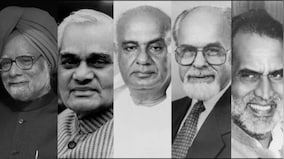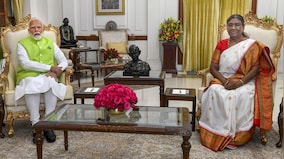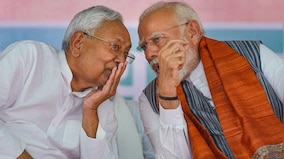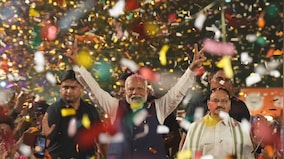As India counts its epic vote, early trends are promising a third consecutive term for PM Modi and his allies in NDA, but with a reduced majority. In this case, some parties in the alliance have emerged as ‘kingmaker’ for the latter.
Some of these parties have history with Congress-led UPA alliance. In this article we take a look back on their journey and how their break-up with congress and alliance with BJP has been over the past years in terms of gains and losses in regional as well as Lok Sabha elections.
Telagu Desam Party: TDP topped this list as early trends show its win on 16 seats. Lead by Chandrababu Naidu, TDP was part of the NDA government between 2014 and 2019. It left the NDA before 2019 Lok Sabha polls and joined the Congress lead UPA alliance to lose in both Lok Sabha and assembly polls.
Soon after the loss, he distanced himself with the Congress and became part of NDA in March 2024, just a few days before the national elections were announced. This alliance looks to have worked in the favour of TDP as it has not just scored well in Lok Sabha elections but have also sweeped the assembly elections, results of which came Tuesday itself.
As per the ECI, TDP was leading in 99 seats out of the 175 seats in state assembly. They are set to form a government in Andhra pradesh with its ally Jana Sena at 15 and BJP at 5.
Janata Dal (United): JD(U) has been placed 2nd in the NDA alliance with a lead on 14 seats. It began its journey with the BJP in 2005 ousting the RJD-led UPA government in Bihar. Nitish Kumar became Chief Minister, and together with BJP, they held a strong position in Bihar, winning both general and assembly elections.
However, in 2013, JD(U) severed ties with BJP over Narendra Modi’s elevation in the BJP, leading to Nitish Kumar resigning as Chief Minister. Next election saw JD(U) aligning with CPI but faced a defeat against the BJP-LJP alliance. Nitish Kumar returned as Chief Minister with RJD’s support after BJP demanded a trust vote.
JD(U) sought alliances beyond Bihar, merging with Socialist Janata in 2014 and attempting a national alliance against BJP with parties like RJD and Janata Dal (Secular) in 2015, which eventually dissolved. Internal dissent led to Jitan Ram Manjhi’s expulsion and the formation of Hindustani Awam Morcha.
In 2017, Nitish Kumar abruptly exited the Grand Alliance and realigned with BJP, causing splits within JD(U) units. However, in 2022, JD(U) ended its alliance with BJP in Bihar, joining a coalition dubbed “Mahagathgandhan 2.0” with RJD and INC.
Post-2020 assembly elections, JD(U) faced setbacks and decided to realign with NDA in January 2024 breaking its ties with RJD and regaining trust vote in the assembly with BJP’s support.
Janta Dal (Secular): JD(S) have also managed to get a lead in 2 seats. The Janata Dal (Secular) emerged from the Janata Dal split in 1999, aligning with the BJP-led NDA in Karnataka. However, it maintained distance from Congress. In 2015, JD(S) joined a coalition against BJP but managed to get one 1 seat in 2019 National elections. Later, in 2023, it joined the NDA under BJP’s leadership.
Lok Jan Shakti Party: ECI data has shown LJP winning on 5 seats. The Lok Janshakti Party (LJP), founded by Ram Vilas Paswan in 2000, initially aligned with the UPA, winning four Lok Sabha seats in alliance with Congress and RJD.
However, in 2005 Bihar assembly polls, it contested against RJD, leading to NDA’s victory with Nitish Kumar as CM. LJP’s 2009 alliance with RJD and SP proved futile. In 2014, after 12 years, LJP rejoined NDA, winning 6 of 7 Lok Sabha seats in Bihar. Ram Vilas Paswan became a minister. In 2015, aligning with NDA again, LJP won only 2 seats in Bihar assembly elections. In 2017, Pashupati Paras, Ram Vilas’s brother, joined Nitish Kumar’s cabinet after JD(U) joined NDA. LJP maintained its win on 6 six seats in the 2019 elections as well.
Pattali Makkal Katchi: Tamil Nadu based PMK is poised to win 1 seat in 2024 Lok Sabha Elections. In the 2004 Lok Sabha elections, PMK joined the UPA, gaining significant power both regionally in Tamil Nadu and at the center. However, by 2009, it left UPA to align with AIADMK. In the 2014 Lok Sabha elections, PMK allied with BJP-led NDA, winning one seat.
In the subsequent 2019 elections, despite continuing its alliance with AIADMK and BJP, PMK failed to secure any seats. The party’s involvement in violent incidents, such as the 2013 clashes and the Ponparappi violence in 2019, received negative attention. PMK’s demands for Vanniyar reservation led to protests, and eventually, the AIADMK government passed a bill fulfilling their demand. In the 2021 Tamil Nadu Assembly elections, PMK won five seats but later distanced itself from AIADMK-led alliance for local body polls.










)
)
)
)